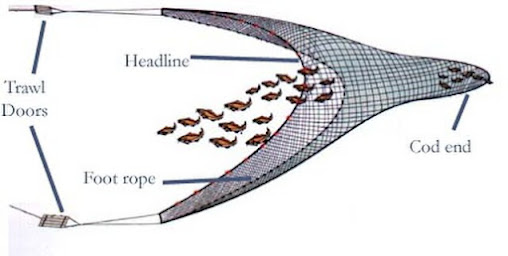Otter boards
Otter board or leeboard on sailing boatImage courtesy Wikimedia Commons
One of the live webcam sites we enjoy watching features the Kiel Canal. It is 61 miles long and links the North Sea and the Baltic Sea. Using it shortens travelling distance by 290 miles, saving time and storm-prone seas.
Construction of the canal started in 1887 and more than 9,000 workers had been employed by its completion. Kaiser Wilhelm II opened the canal on 20th June, 1895, as the Kaiser-Wilhelm-Kanal. The name was changed to the current one in 1948.
An average of ninety vessels traverse it daily, carrying freight or oil or passengers. Large container ships and small yachts alike appreciate its convenience.
Image courtesy Wikimedia CommonsWe don’t watch it avidly by the hour, but have it in the background, as an interesting insight into another way of life. Today, Barry spotted a Dutch barge and pointed out the otter board and its use.
Image courtesy Wikimedia CommonsMore commonly known as leeboards, otter boards are used mostly by sailing boats instead of a fixed keel. They allow boats with a shallow draft to navigate shallower waters than would otherwise be possible and do not take up the space inboard that a retractable centreboard does.
Sailing barge with otter board on the Thames at Oxford
Image courtesy Wikimedia Commons
They were used from the 8th century in Chinese warships. They ‘held the ships, so that even when wind and wave arise in fury, they are neither driven sideways, nor overturn.’ By the later 16th century, they were being used in Dutch barges and Thames barges, enabling them to move closer inshore, making the loading and unloading of cargo much easier.
Diagram showing trawl net with otter boards, also known as doors
Image courtesy Wikimedia Commons
There is another meaning for otter boards. Sometimes known as doors, they are used in fishing boats to keep the net open horizontally as it is trawled through the sea.
.JPG)

,_RP-P-1910-3461.jpg)


Oh that is so cool, I have always wondered about otter boards and how they work. You are so very helpful, thank you fo the information you so generously share- we are smarter for it! Cheers!
ReplyDeleteThe otter boards on fishing trawlers are so interesting.
DeleteThank you. I have heard of otter boards but not known what they were used for.
ReplyDeleteVery interesting. I thought I had a reasonably good handle on boat-related terminology but I hadn't heard about otter boards before.
ReplyDeleteYou learn something new every day!
Cheers, Gail.
I learn something new every day - it's a pity I don't retain it;-)
DeleteOtter boards basically leave no chances for the fish to survive
ReplyDeleteI didn't know about otter boards but I can understand better now why they are important. Thanks Janice.
ReplyDeleteI might even remember some of this;-)
DeleteI didn't know that, I have to say that I don't like fishing at all, doesn't matter how they are caught, unfortunately I like to eat fish !!
ReplyDeleteIf we all had to catch and prepare our own food, our diets might change!
DeleteMost interesting. No link to the Kiel camera view?
ReplyDeleteStill not sure that I fully understand how they work. I may need to re-read your post!
ReplyDeleteI will examine you on the post later;-)
ReplyDeleteExtremely interesting! I have never heard of Otter Boards before.
ReplyDeleteI hadn't either, until my husband pointed them out.
ReplyDeleteHow interesting, I'd never heard of otter boards, but will be able to sound all knowledgeable if I spot some from now on! xxx
ReplyDeleteHow to be a dilettante - just follow a few blogs ;-)
DeleteMy daughter has gotten into watching web cams of different areas. It started with the Duluth cam and she's been spreading into other areas as well. I will suggest this one to her. She finds them very relaxing to sit and pet her cats after a stressful day at work with the Duluth cam or whichever one it is in the background.
ReplyDeleteThey are relaxing. We use ours as background, a moving wallpaper, if you will.
DeleteI’ve often seen smaller boats resting on boards either side of them like these and assumed it was because they were moored in tidal estuaries. Would they be otter boards with another use I wonder.
ReplyDeleteThose are different, I'm told. (I know nothing . . . )
DeleteYou do watch some interesting web-cams.
ReplyDeleteAll the best Jan
There are lots of webcams, some more interesting than others. We also like the Dartmouth and the Salty Cottage ones, and the various Isle of Wight Cams.
DeleteI had zero clue. I love water, but haven't spent much time on boats.
ReplyDeleteAll Brits believe they have salt water in their veins ;-)
Delete